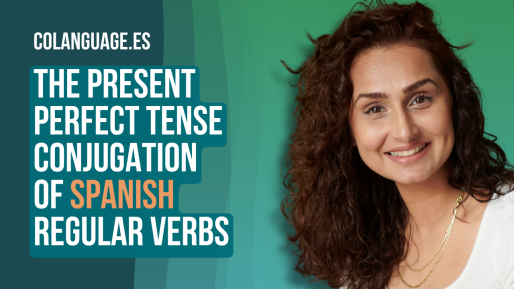The imperfect past tense: conjugation of Spanish regular verbs Share Copied!
Spanish
Learn how to conjugate regular verbs in the imperfect past tense in Spanish.
Video
Podcast
What is the imperfect past tense?
The imperfect tense is used to describe past actions that were ongoing, habitual, or were occurring without a definite beginning or end.
- Solía caminar todos los días al trabajo. (I used to walk everyday to work.)
- Se sentía enfermo. (He was feeling sick.)
- Por lo general, llegaban temprano. (They usually arrived early.)
The imperfect past tense of verbs ending in "-ar"
In the imperfect past tense, regular Spanish verbs ending in "-ar" undergo conjugation changes by replacing the ending with specific suffixes (-aba, -abas, -aba, -ábamos, -abais, -aban) to match different subjects.
Conjugation of the verb "contar" (to tell)
This table shows the conjugation of the verb "contar" (to tell) in the imperfect past tense.
| Personal pronoun | Spanish | English |
|---|---|---|
| Yo (I) | Yo contaba una historia interesante el otro día. | I was telling an interesting story the other day. |
| Tú (You) | Recuerdo que hace años, tú contabas chistes graciosos. | I remember years ago, you used to tell funny jokes. |
| Él/Ella (He/She/It) | Él contaba sus experiencias después del viaje. | He used to tell his experiences after traveling. |
| Nosotros/-as (We) | Nosotras contábamos anécdotas divertidas. | We were telling amusing stories. |
| Vosotros/-as (You) | Vosotros contabais secretos de pequeños. | You used to tell secrets as kids. |
| Ellos/-as (They) | Ellos contaban sus planes para el fin de semana. | They were telling their plans for the weekend. |
The imperfect can be used to refer to an usual action that took place in the past.
Listening exercise
This dialogue demonstrates the conjugation of "-ar" verbs in the imperfect past tense.
| Spanish | English | |
|---|---|---|
| María | Cuando era joven, contaba muchas historias divertidas a mis amigos. | When I was young, I used to tell many funny stories to my friends. |
| Daniel | ¡Qué divertido! Mis hermanas contaban chistes a toda la familia. | How fun! My sisters used to tell jokes to the whole family. |
| María | ¿Y vosotras os contabais secretos también? | And did you tell each other secrets too? |
| Daniel | Sí, también recuerdo que nos contábamos secretos. | Yes, I also remember that we used to tell each other secrets. |
Notice that the conjugated verb only has an accent when we use the plural form "nosotros/-as" (we).
Nosotros contábamos (We used to tell)
The imperfect past tense of verbs ending in "-er"
Regular Spanish verbs ending in "-er" are conjugated in the imperfect past tense by replacing the ending with -ía, -ías, -ía, -íamos, -íais, -ían, depending on the subject.
Conjugation of the verb "leer" (to read)
This table shows the conjugation of the verb "leer" (to read) in the imperfect past tense.
| Personal pronoun | Spanish | English |
|---|---|---|
| Yo (I) | Yo leía un libro interesante. | I was reading an interesting book. |
| Tú (You) | Tú leías el periódico todas las mañanas. | You were reading the newspaper every morning. |
| Él/Ella (He/She/It) | Él leía novelas de misterio. | He was reading mystery novels. |
| Nosotros/-as (We) | Nosotros leíamos cuentos a los niños. | We were reading stories to the children. |
| Vosotros/-as (You) | Vosotras leíais revistas de viajes. | You were reading travel magazines. |
| Ellos/-as (They) | Ellas leían poesía en el parque. | They were reading poetry in the park. |
Listening exercise
This dialogue shows the conjugation of "-er" verbs in the imperfect past tense.
| Spanish | English | |
|---|---|---|
| María | ¿Tu leías muchos libros de pequeño? | Did you read many books as a child? |
| Daniel | Sí, normalmente leía un libro por semana, era una de mis pasiones favoritas. | Yes, I usually read a book a week, it was one of my favourite passions. |
| María | ¡Qué coincidencia! Mi hermana y yo también leíamos mucho, normalmente cómics. | What a coincidence! My sister and I also read a lot, usually comics. |
The imperfect past tense of verbs ending in "-ir"
When expressing actions in the imperfect past tense, regular Spanish verbs ending in "-ir" are modified by replacing the ending with the suffixes -ía, -ías, -ía, -íamos, -íais, -ían.
Conjugation of the verb "abrir" (to open)
This table shows the conjugation of the verb "abrir" (to open) in the imperfect past tense.
| Personal pronoun | Spanish | English |
|---|---|---|
| Yo (I) | Yo abría la puerta lentamente. | I was opening the door slowly. |
| Tú (You) | Tú abrías las ventanas todas las mañanas. | You were opening the windows every morning. |
| Él/Ella (He/She/It) | Él abría el libro con curiosidad. | He was opening the book with curiosity. |
| Nosotros/-as (We) | Nosotros abríamos los regalos después de la fiesta. | We used to open the gifts after the party. |
| Vosotros/-as (You) | Vosotros abríais las cartas con entusiasmo. | You used to open the letters with excitement. |
| Ellos/-as (They) | Cuando llegaba el profesor, ellos abrían los libros rápidamente. | When the teacher arrived, they quickly opened the books. |
The suffixes for verbs ending in "-ir" are the same as the verbs ending in "-er".
Listening exercise
Here is shown how to use the conjugation of "-ir" verbs in the imperfect past tense in a dialogue.
| Spanish | English | |
|---|---|---|
| María | ¿Tú qué recuerdas de tu niñez? | What do you remember from your childhood? |
| Daniel | Recuerdo que cada tarde, abría las ventanas para que entrara la brisa fresca. ¿Y tú? | I remember that every afternoon, I opened the windows to let in the fresh breeze. And you? |
| María | Mi hermano y yo siempre abríamos la puerta de la nevera para merendar. | My brother and I always opened the refrigerator door to have a snack. |
| Daniel | ¡Es verdad! Y tu mamá siempre abría un paquete de galletas cuando os visitaba después del colegio. | It's true! And your mom always opened a pack of cookies when I visited you after school. |
Key takeaways
Here is a quick summary of this lesson.
- The imperfect tense is used to describe past actions that were ongoing, habitual, or were occurring without a definite beginning or end.
- Regular verbs ending in "-ar" are conjugated by replacing the ending with the suffixes -aba, -abas, -aba, -ábamos, -abais, -aban.
- Regular verbs ending in "-er" and "-ir" are conjugated in the imperfect past tense by replacing the ending with -ía, -ías, -ía, -íamos, -íais, -ían.
- Irregular verbs do not follow any patterns.
Subscribe to our social media channels to get free daily exercises!



